That Water Bottle You Discarded Is Being Recycled By Lakshmi In A Mumbai Slum Right Now. See How.
You will truly see how one man's trash is another man's (or woman's) meal in this essay which ventures into the Mumbai slums and takes a look into the lives of the "entrepreneurs" who are trying to eke out a living from plastic discards. Meet the fiesty Lakshmi and learn how she responds when her daughter is teased with "Teri maa kachre wali hai"!
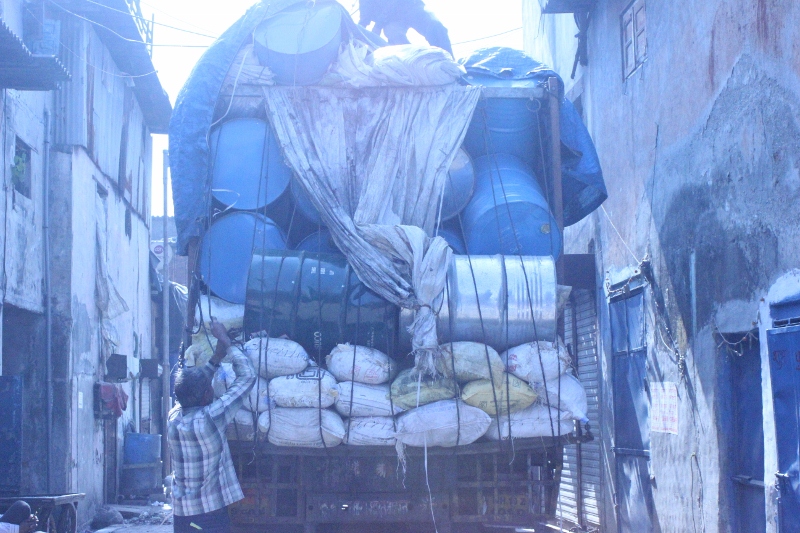
Ever wondered what happens to all your trash plastic once it is picked from your home? Apart from its consumption by animals and water bodies, of course. It is interesting to know how what goes around does come around after all.
Frail-looking Lakshmi works amidst at least 15 men as she sorts a heap of plastic into almost 7 different piles. Technically she doesn’t know the difference between LDPE and HDPE and other kinds of plastics, but her experience of working in this sector for more than a decade has taught her well. She carefully unscrews the ‘Bisleri’ bottle cap and the seal and throws them in one corner while she peels off the thin wrapping and makes another pile of it; leaving just the bare bottle in the central heap.
It’s a fairly mundane job, but Laxmi and many women like her diligently sort almost 100-150kgs of plastic during their daily 10am to 7pm shift. This is the designated role of women and children while the men have different roles in this self-sustaining and fast-expanding plastic recycling business in the so called “dirty” areas of Mumbai – its slums.
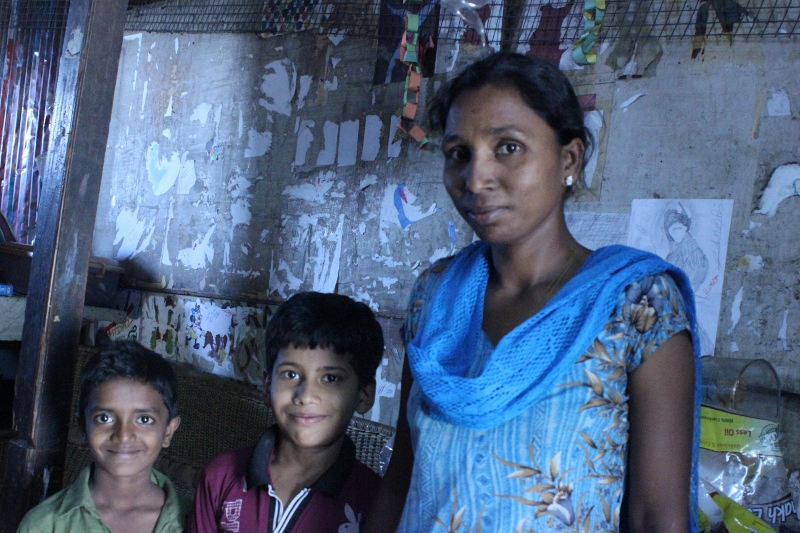
These unsung heroes do everything – right from scrounging for plastic by sticking their hands into sewers and garbage dumps, then colouring the plastic according to its brand, grinding it to small pieces so that they can be melted easily, then washing it to rid it of any impurities or previous contents, to churning out plastic pellets that are then sold to the ‘kabadiwalas’. Almost 10-15 tonnes of plastic is recycled here every day.
However, not everyone does everything. Out of 100 godowns, probably 10 have grinding machines and 3 have pellet making machines. These are heavy duty machines that draw huge amounts of electricity. Thus the cost of converting plastics into pellets is shared by everyone benefiting from it. It costs the ones who don’t own any of these machines around Rs. 6/kg for grinding, Rs.8/kg for pellet making, Rs.2/kg for washing and Rs.1.5/kg for colouring. The water used for washing operations is usually corporation water or tanker water, and goes into the sewers after is use.
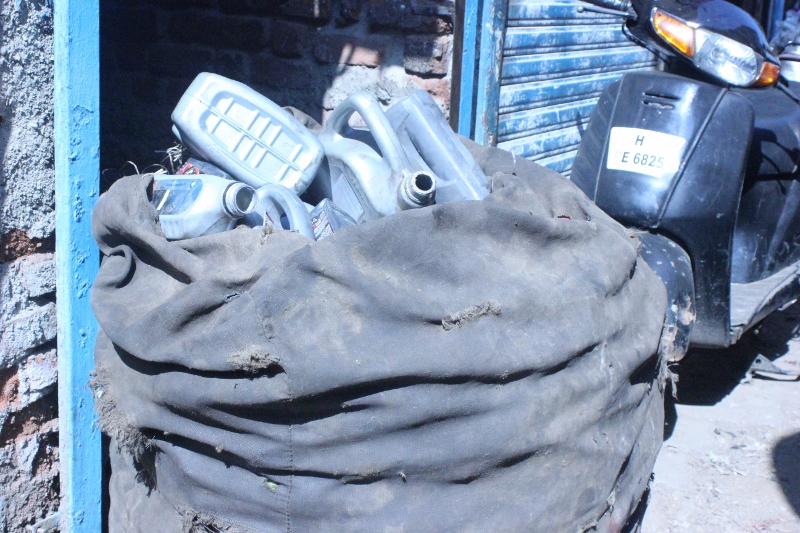
Lakshmi’s mother Hanumanti, Naseem and Kanta bai were the first three women to get their hands dirty in this business. Inspired, Laxmi too decided to follow her mother’s footsteps but faced a lot of hardships along the way. She definitely had to suffer the stigma attached to the menial profession. Her daughter would get teased in school by kids whose parents were drivers or housewives with, “Teri maa kachre wali hai (your mother’s a wastepicker)”, which compelled Laxmi to get feisty and explain to the kids how having a job, financial independence through her own business made her far better than any of their parents who were slaves to someone else’s demands.
Dealing with waste being a low caste job is not all that they had to deal with. Another addition to their problems came in the form of BMC (Brihan mumbai Municipal Corporation). BMC alleged that sewers were getting cogged because of this plastic recycling business. None of them including Laxmi had been educated about the BMC rules and knew no other way of countering the allegations except by paying a fine. They have now settled with the BMC for the usual “hafta” (weekly commission).
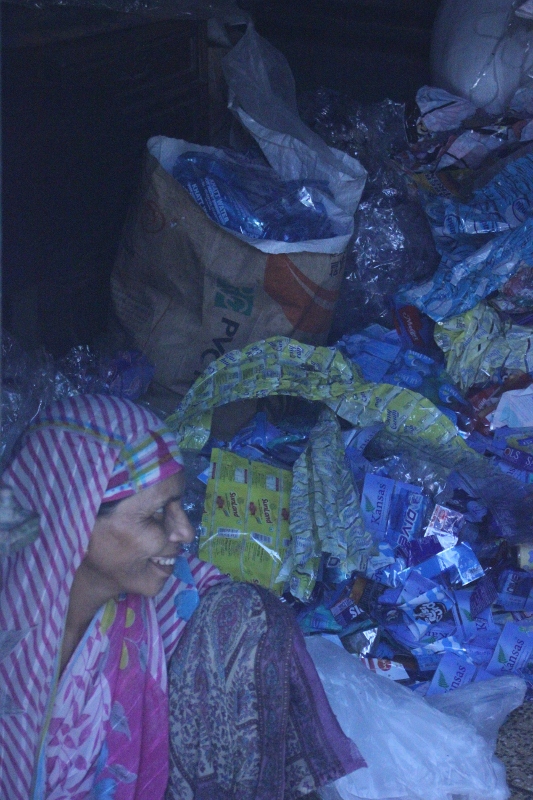
Just like every other system, this one too has its flaws. When it began it was far less organised; with fewer people to collect and sort the plastic, but today the workforce is large and growing strong. Yet it is a long way from becoming an efficient plastic recycling system.The water that is recovered after the washing operation is sent to the sewers. While it’s still better than the plastic that previously occupied the same place, there’s still scope for something to be done on that front.
Also, some thin plastics like cassette reels and wrappers are useless since they cannot be recycled. Termed as excess plastic, this amounts to almost 100-150kg of plastic in a day that is burnt in the open. But creative Laxmi has found a way to utilize the ‘useless’ plastics too. Her pride shows in the form of a colourful crochet bag that is seen dangling from her modest abode.

Thankfully people like Laxmi have made it their business to clean up the plastic that is choking the city drains, killing animals and livestock, and producing harmful toxic gases when burnt in the open. And it seems only fair for them to make some money out of it. Just Bisleri plastic pellets fetch around Rs. 40/kg.
It means so much to the workers that even after the 2011 demolition of the slums and their rehabilitation in Govandi (another end of the city), the workers come to the Dharavi godowns to work.
What some of us call garbage is livelihood and lifestyle for Laxmi, and what’s more, it’s an effective waste management option.
Like this story? Or have something to share? Write to us: [email protected], or connect with us on Facebook and Twitter (@thebetterindia).

Similar Story
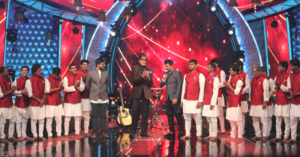
27-YO Mumbaikar Woman Helps Beggars Turn Professional Singers, Earn Rs 35000/Show!
Almost nine years ago Hemlata boarded the local train on her way to a musical evening. As she got off at the station, two street singers were welcoming the travellers with their musical skill. “They were singing so well that I remember standing there and just listening to them for a while,” recalls Hemlata.
Read more >
If you found our stories insightful, informative, or even just enjoyable, we invite you to consider making a voluntary payment to support the work we do at The Better India. Your contribution helps us continue producing quality content that educates, inspires, and drives positive change.
Choose one of the payment options below for your contribution-
By paying for the stories you value, you directly contribute to sustaining our efforts focused on making a difference in the world. Together, let's ensure that impactful stories continue to be told and shared, enriching lives and communities alike.
Thank you for your support. Here are some frequently asked questions you might find helpful to know why you are contributing?


This story made me
-
97
-
121
-
89
-
167












